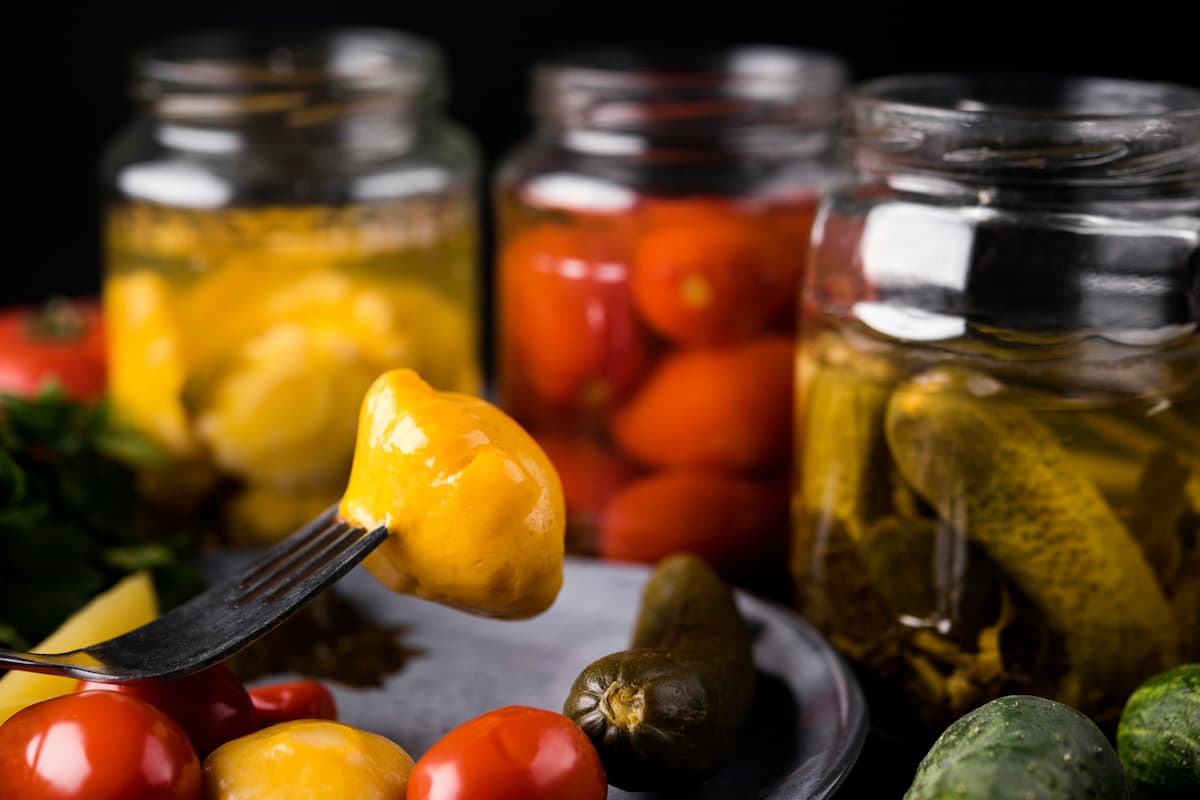Who Invented Fermentation?
Fermentation, a natural process that converts sugars into acids, gases, or alcohol, plays a vital role in food and beverage production. This ancient technique enhances flavors, preserves food, and even offers health benefits. But who invented fermentation? Let's delve into this fascinating topic and explore the history and science behind the art of fermentation.
The History of Fermentation

Fermentation has a long and storied history, dating back thousands of years. This process has been used by countless cultures to preserve food, enhance flavors, and create unique and delicious dishes. In this section, we'll explore the ancient practices of fermentation, its use in various cultures, and its role in agriculture.
Ancient Practices of Fermentation
One might wonder who invented fermentation, but the truth is that it's a naturally occurring process that humans have harnessed and utilized over time. The earliest evidence of fermentation dates back around 9,000 years to the Neolithic period. People in this era discovered the transformative power of fermentation in foods such as yogurt, cheese, and bread. In fact, the production of beer and wine can also be traced back to ancient civilizations like Mesopotamia and Egypt, where they played an essential role in religious ceremonies and social gatherings.
Fermentation in Different Cultures
As societies developed and expanded, so too did the practice of fermentation. In Asia, the art of fermenting fish and soybeans led to the creation of sauces and pastes that still form the backbone of many culinary traditions today. In Europe, the practice of fermenting cabbage to make sauerkraut became popular, while in the Americas, native people utilized fermentation in the production of beverages like pulque and chicha.
These diverse applications of fermentation showcase the versatility of the process and its importance in shaping food culture around the world. From the tangy flavors of Korean kimchi to the effervescence of French champagne, the impact of fermentation can be seen and tasted in countless dishes and drinks enjoyed today.
The Role of Fermentation in Agriculture
Fermentation has also played a significant role in agriculture, particularly in the preservation of food. Before the invention of modern refrigeration, people relied on fermentation to extend the shelf life of their produce and prevent spoilage. This allowed them to store surplus harvests for longer periods, ensuring a steady food supply during leaner times. In addition to preservation, fermentation can also enhance the nutritional value of certain foods, making it an essential tool for maintaining a healthy and balanced diet.
In conclusion, while it's difficult to pinpoint exactly who invented fermentation, it's clear that this remarkable process has played a vital role in the development of human civilization and continues to be a crucial aspect of our culinary heritage.
Louis Pasteur: The Father of Fermentation
When discussing the invention of fermentation, it's impossible not to mention Louis Pasteur, a renowned French chemist and microbiologist. His groundbreaking research laid the foundation for modern fermentation science and earned him the title "The Father of Fermentation."
Pasteur's Background and Early Life
Having grown up in a humble family, Pasteur's early life was filled with curiosity and a passion for learning. He went on to study at the École Normale Supérieure in Paris, where he earned his doctorate in sciences. His dedication to research and his innovative mindset led him to make significant contributions to various scientific fields, including chemistry, biology, and medicine.
Pasteur's Work on Spontaneous Generation
One of Pasteur's most well-known discoveries was his debunking of the theory of spontaneous generation. This outdated belief posited that living organisms could arise spontaneously from non-living matter. Through a series of carefully designed experiments, Pasteur was able to prove that microorganisms, such as yeast, were responsible for the fermentation process. This vital discovery led to the development of more controlled and efficient fermentation techniques.
Pasteur's Research on Alcoholic Fermentation
In addition to his work on spontaneous generation, Pasteur also conducted extensive research on alcoholic fermentation. He discovered that yeast, a type of microorganism, played a crucial role in converting sugar into alcohol and carbon dioxide. This finding not only revolutionized the brewing and wine-making industries but also paved the way for further scientific exploration into the role of microorganisms in food and beverage production.
In conclusion, while the practice of fermentation has been around for centuries, it was Louis Pasteur's pioneering research that truly shaped our understanding of the process. As the father of fermentation, Pasteur's work has had a lasting impact on the food and beverage industries, as well as on the broader scientific community.
The Science Behind Fermentation
Understanding the science behind fermentation helps to appreciate its role in creating various food and beverage products. The process involves several components, including yeast as the key microorganism, the chemical process itself, and various types of fermentation that result in diverse products.
Yeast as the Key Microorganism in Fermentation
One of the essential elements in fermentation is yeast. As a type of microorganism, yeast plays a crucial role in breaking down sugars into alcohol and carbon dioxide. This process is responsible for the characteristic flavors and textures found in fermented products such as beer, wine, and bread. The discovery of yeast's role in fermentation is credited to Louis Pasteur, who demonstrated the importance of these microscopic organisms in the 19th century.
The Chemical Process of Fermentation
The chemical process of fermentation involves the conversion of sugars into other compounds, such as alcohol, acids, and gases. This transformation occurs due to the metabolic activity of yeast and other microorganisms. During fermentation, these organisms consume the sugars and produce byproducts that give fermented foods and beverages their unique characteristics. For example, yeast converts glucose into ethanol and carbon dioxide, resulting in the production of alcoholic beverages such as beer and wine.
Different Types of Fermentation and Their Products
There are several types of fermentation processes, each yielding a variety of products. Some common types of fermentation include:
- Alcoholic fermentation: This process, primarily driven by yeast, results in the production of ethanol and carbon dioxide. It is responsible for creating beer, wine, and other alcoholic beverages.
- Lactic acid fermentation: In this process, lactic acid bacteria convert sugars into lactic acid. Lactic acid fermentation is essential in the production of yogurt, sauerkraut, kimchi, and other fermented dairy and vegetable products.
- Acetic acid fermentation: Acetic acid bacteria are responsible for this type of fermentation, which involves converting sugars and alcohol into acetic acid. This process is essential for making vinegar and other sour-tasting products.
As the science of fermentation continues to evolve, so do the techniques and technologies used to create a diverse range of fermented products. The understanding of yeast's role, the chemical process, and different types of fermentation all contribute to the widespread use of fermentation in food and beverage production.
Modern Fermentation Techniques and Technologies

Over the years, fermentation practices have evolved significantly, with new technologies and techniques enhancing the process. In this section, we will discuss the evolution of fermentation practices, industrial fermentation methods, and the role of fermentation in alternative protein production.
Evolution of Fermentation Practices
From ancient times to the present day, the art and science of fermentation have come a long way. Modern practices now incorporate advanced scientific knowledge and techniques to optimize the process. For example, researchers can now isolate and identify specific strains of yeast and bacteria to achieve desired fermentation outcomes. Additionally, fermentation vessels and equipment have been developed to maintain precise environmental conditions, ensuring optimal results.
Industrial Fermentation Methods
In the industrial setting, several fermentation methods are employed to produce various products, such as biofuels, pharmaceuticals, and food ingredients. Some of these methods include:
- Batch fermentation: In this method, all the required nutrients and microorganisms are added to the fermentation vessel at once, and the process occurs without any additional input until completion.
- Fed-batch fermentation: This method involves the gradual addition of nutrients to the fermentation vessel over time, allowing for better control over the process and potentially higher yields.
- Open fermentation: An open system is used in this method, allowing for the exchange of gases and, in some cases, the addition or removal of nutrients and waste products during the process.
- Continuous fermentation: As the name suggests, this method involves a continuous flow of nutrients and microorganisms through the fermentation vessel, with products and waste materials being constantly removed, leading to a more efficient and steady production.
The Role of Fermentation in Alternative Protein Production
With the increasing demand for sustainable and environmentally friendly food sources, fermentation has emerged as a promising technique for alternative protein production. By utilizing microorganisms like yeast, bacteria, and fungi, scientists can produce high-quality proteins that can be used as substitutes for animal-derived proteins. This process can help reduce the environmental impact of traditional livestock farming and provide a more sustainable food source for the growing global population. Moreover, the products obtained through alternative protein fermentation have the potential to offer additional health benefits, such as improved gut health and reduced inflammation.
Fermentation and BurpLids®
As fermentation continues to gain popularity in the food and beverage industry, innovative products like BurpLids® have emerged to make the process easier and more efficient. In this section, the benefits of using BurpLids® in fermentation, the features and advantages of the BurpLids® fermentation kit, and the target audience for BurpLids® and its fermentation products will be discussed.
The Benefits of Using BurpLids® in Fermentation
Using BurpLids® in fermentation offers numerous advantages, including:
- Faster and more efficient curing, allowing growers to achieve the desired results in less time.
- Elimination of the need for daily burping of mason jar lids, simplifying the fermentation process and reducing the risk of mold and spoilage.
- Achieving a successful cure, maximizing potency and flavor in every batch of fermented products.
Features and Advantages of the BurpLids® Fermentation Kit
Growers can benefit from the BurpLids® fermentation kit, which includes:
- Four fermenting jar lids, designed to make the fermentation process easy and efficient.
- One extraction pump, ensuring a consistent and controlled environment for successful fermentation.
- Two weights, helping to keep the fermenting materials submerged in liquid for optimal results.
The kit is versatile and can be used for a variety of fermentation projects, making it a valuable addition to any grower's toolkit.
The Target Audience for BurpLids® and Its Fermentation Products
BurpLids® caters to growers who want to cure their crops to perfection, ensuring the best possible flavor, potency, and overall quality of their fermented products. This includes home gardeners, small-scale farmers, and even larger agricultural operations. The user-friendly design and benefits of BurpLids® products make them an appealing choice for those looking to enhance their fermentation experience.
Health Benefits of Fermented Foods
Fermented foods have gained popularity in recent years, not just for their unique flavors but also for their numerous health benefits. When it comes to the health benefits of fermented foods, three key areas stand out: improved gut health, reduced inflammation, and the connection between gut health and brain health.
Improved Gut Health
One of the primary benefits of consuming fermented foods is the improvement in gut health. Fermented foods are rich in probiotics, which are beneficial bacteria that help maintain a healthy balance of gut flora. A well-balanced gut microbiome is essential for proper digestion, nutrient absorption, and overall gut health. Including fermented foods such as yogurt, kimchi, sauerkraut, and kombucha in one's diet can contribute to a healthier gut.
Reduced Inflammation
Another advantage of consuming fermented foods is their potential to reduce inflammation in the body. Inflammation is a natural response to injury or infection, but chronic inflammation can contribute to various health issues, including heart disease, diabetes, and autoimmune disorders. The probiotics found in fermented foods can help regulate the immune system and reduce inflammation, promoting overall health and well-being.
Connection Between Gut Health and Brain Health
Research has shown that there is a strong connection between gut health and brain health, often referred to as the gut-brain axis. This link suggests that maintaining a healthy gut microbiome can have a positive impact on mental health and cognitive function. Dr. David Perlmutter's book "BrainMaker" highlights this connection, exploring the benefits of fermented foods in preventing Alzheimer's disease and memory loss. By incorporating fermented foods into one's diet, individuals may be able to support not only their gut health but also their brain health.
In conclusion, the health benefits of fermented foods make them a valuable addition to a balanced diet. By enjoying these foods, people can improve their gut health, reduce inflammation, and support a healthy connection between their gut and brain.
Conclusion
In conclusion, the invention of fermentation can be attributed to Louis Pasteur, who played a significant role in understanding the process and its importance. His work shed light on the crucial role of yeast in alcoholic fermentation, making him the father of fermentation. Fermentation has come a long way since then, impacting the food, beverage, and health industries in various ways.
Delving deeper into this impact, let's consider the benefits of fermentation that extend beyond mere taste enhancement. Fermentation not only increases the shelf life of food but also boosts its nutritional content by fostering the growth of beneficial bacteria. These probiotics are key players in improving gut health, which is intrinsically linked to a stronger immune system and enhanced absorption of vital nutrients.
Today, fermentation continues to be an essential process, not just for enhancing flavors in food and beverages, but also for its health benefits. As research on gut health and brain health, such as Dr. David Perlmutter's book "BrainMaker," reveals the importance of fermented foods in our diets, it becomes even more crucial to understand and appreciate the process.
For those interested in exploring more about fermentation and trying it out, BurpLids® offers an exciting range of products designed to make the process more manageable and efficient. So, why not dive into the world of fermentation and experience its benefits firsthand? With the right tools and enthusiasm, anyone can master this ancient technique and enjoy the rewards it brings.
Explore Fermentation Further
Now that you've delved into the history and science of fermentation, why not explore more on this fascinating topic?
-
Visit the BurpLids® website
to discover their range of fermentation products and learn more about the benefits of fermentation. -
Participate in the BurpLids® Premium Fermenting Lids Kit giveaway
for a chance to win a kit valued at $139. -
Read more articles on flavor enhancement through fermentation
on the BurpLids® blog for additional insights and tips. -
Check out Dr. David Perlmutter's book "BrainMaker"
to learn more about the connection between gut health and brain health through fermented foods.
 Plastic BurpLids® Curing Kit
Plastic BurpLids® Curing Kit
 BurpLids® 12 Pack Curing Kit
BurpLids® 12 Pack Curing Kit
 BurpLids® 14 Pack Curing Kit
BurpLids® 14 Pack Curing Kit
 BurpLids® Pack Of 4 Fermentation Kit
BurpLids® Pack Of 4 Fermentation Kit





